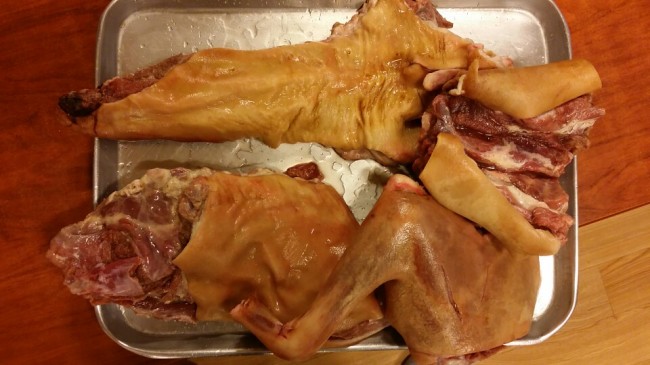Animal rights activists from the U.S. freed 57 dogs destined for slaughterhouses in South Korea, according to statements on their websites on Friday, touching off an ongoing debate here between supporters of dog eating and those of animal rights.
Activists from the Humane Society International and the Change for Animals Foundation freed the dogs from a dog meat farm in South Korea, the online statement said. They will be rehomed in South Korea and the U.S. The activists aim to end dog eating in South Korea.

But their actions renewed a decades-old debate involving activists who say dog-slaying in South Korea often involves inhumane practices, and dog consumption advocates who say the Koreans’ centuries-old tradition is no different from the killing of cows, pigs and hens.
Thousands in South Korea eat millions of dogs each year. Accurate numbers are unavailable, however, due to the lack of government oversight. Unconfirmed tallies by dog meat lovers in 2012 put annual consumption at 2 million dogs.
Numbers are unclear because the Livestock Products Sanitary Control Act, a law setting safety rules in the butchering of farm animals, does not label dogs as meat subject to sanitary rules, making government regulation over dog slaughterhouses a legal impossibility.
Neither does it explicitly outlaw dog eating. Even when provincial laws ban dog eating, enforcement is lax.
Dogs raised for their meat are known to be exposed to crowded habitation, confinement to iron cages until butchering, and slaughtering practices showing butchers killing dogs within sight of other soon-to-be-killed canines.
Dogs are also rarely checked for human-transmittable diseases before distribution in meat markets.
Animal rights activists cite these practices as grounds justifying the abolition of dog eating in South Korea.
Dog meat advocates, however, say such a move is extreme. They say the industry deserves more oversight to ensure that dog meat is safe for popular consumption.
“The media seem to be portraying our trade in a negative spotlight all the time. There are a lot of (slaughterhouses) that offers dogs sanitary environments,” a 30-year owner of a dog meat restaurant in Seoul said.
The debate has been caught in an unending cycle, with calls to increase government regulations over dog meat production met by animal rights protests to voice opposition to moves that would support canine-killing.
Dog eating was first challenged in the 1980s when the South Korean government sought to clamp down on the practice during the years leading up to 1986 Seoul Asian Games and the 1988 Seoul Summer Olympics, when officials did not want to upset international dog-loving visitors.
The issue arose again in the late 1990s and early 2000s when Kim Hong-shin, a lawmaker, tried to legalize dog eating and strengthen safety standards in canine slaughterhouses throughout the country.
By Jeong Hunny (hj257@heraldcorp.com)
Activists from the Humane Society International and the Change for Animals Foundation freed the dogs from a dog meat farm in South Korea, the online statement said. They will be rehomed in South Korea and the U.S. The activists aim to end dog eating in South Korea.

But their actions renewed a decades-old debate involving activists who say dog-slaying in South Korea often involves inhumane practices, and dog consumption advocates who say the Koreans’ centuries-old tradition is no different from the killing of cows, pigs and hens.
Thousands in South Korea eat millions of dogs each year. Accurate numbers are unavailable, however, due to the lack of government oversight. Unconfirmed tallies by dog meat lovers in 2012 put annual consumption at 2 million dogs.
Numbers are unclear because the Livestock Products Sanitary Control Act, a law setting safety rules in the butchering of farm animals, does not label dogs as meat subject to sanitary rules, making government regulation over dog slaughterhouses a legal impossibility.
Neither does it explicitly outlaw dog eating. Even when provincial laws ban dog eating, enforcement is lax.
Dogs raised for their meat are known to be exposed to crowded habitation, confinement to iron cages until butchering, and slaughtering practices showing butchers killing dogs within sight of other soon-to-be-killed canines.
Dogs are also rarely checked for human-transmittable diseases before distribution in meat markets.
Animal rights activists cite these practices as grounds justifying the abolition of dog eating in South Korea.
Dog meat advocates, however, say such a move is extreme. They say the industry deserves more oversight to ensure that dog meat is safe for popular consumption.
“The media seem to be portraying our trade in a negative spotlight all the time. There are a lot of (slaughterhouses) that offers dogs sanitary environments,” a 30-year owner of a dog meat restaurant in Seoul said.
The debate has been caught in an unending cycle, with calls to increase government regulations over dog meat production met by animal rights protests to voice opposition to moves that would support canine-killing.
Dog eating was first challenged in the 1980s when the South Korean government sought to clamp down on the practice during the years leading up to 1986 Seoul Asian Games and the 1988 Seoul Summer Olympics, when officials did not want to upset international dog-loving visitors.
The issue arose again in the late 1990s and early 2000s when Kim Hong-shin, a lawmaker, tried to legalize dog eating and strengthen safety standards in canine slaughterhouses throughout the country.
By Jeong Hunny (hj257@heraldcorp.com)
-
Articles by Korea Herald





![[Herald Interview] 'Amid aging population, Korea to invite more young professionals from overseas'](http://res.heraldm.com/phpwas/restmb_idxmake.php?idx=644&simg=/content/image/2024/04/24/20240424050844_0.jpg&u=20240424200058)












![[KH Explains] Korean shipbuilding stocks rally: Real growth or bubble?](http://res.heraldm.com/phpwas/restmb_idxmake.php?idx=652&simg=/content/image/2024/04/25/20240425050656_0.jpg&u=)

